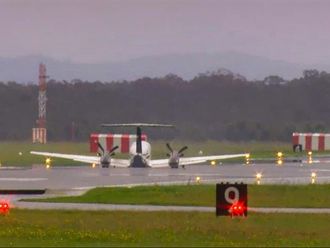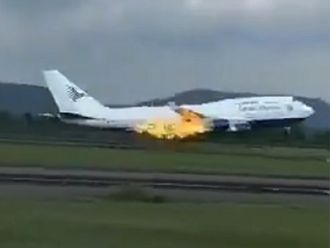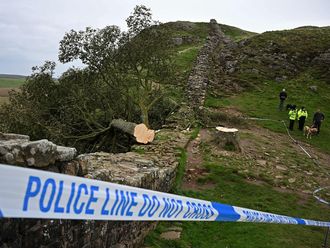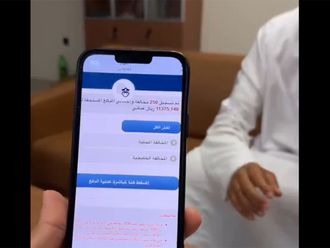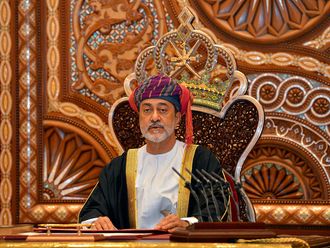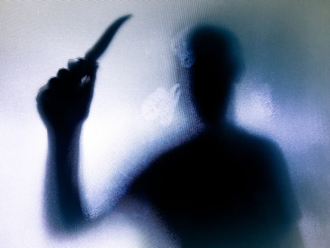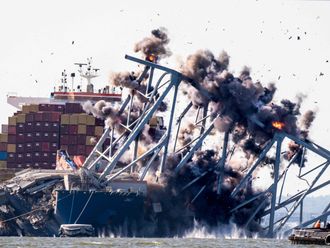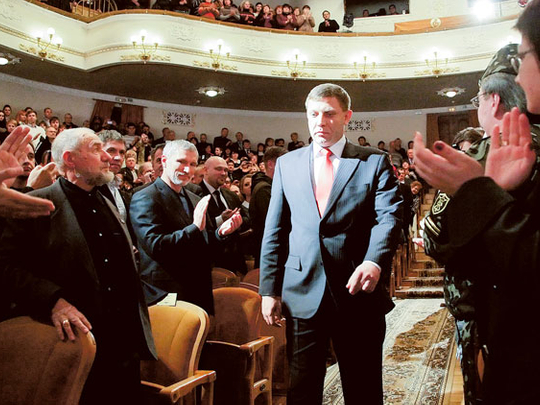
Kiev: The leader of separatist rebels in eastern Ukraine was sworn in Tuesday as head of a self-declared secessionist territory following an election that was condemned by the West as illegal and destabilising.
Alexander Zakharchenko, 38, was inaugurated in a heavily guarded theatre in the main stronghold of a rebel-controlled territory that separatists call the Donetsk People’s Republic.
Zakharchenko’s election was largely a formality as no strong candidates opposed him, but the rebels say the vote gives them a mandate to pursue their secessionist goals.
Ukraine and Western governments say Sunday’s poll gravely endangered a much-violated ceasefire agreed upon in September that envisioned local elections across the whole of the east but under Ukrainian law. Russia, however, quickly lent its support to the vote.
German Chancellor Angela Merkel, underlining her displeasure over what she said was Russia’s role in the conflict, said there is no reason yet to lift European Union sanctions against Moscow. Merkel said she hopes for a diplomatic solution to Ukraine’s crisis but added the vote shows “how difficult it is even to maintain agreements that have been made, if we look at the illegal elections.”
Fighting eased after the truce but eastern Ukraine still sees almost daily clashes.
Zakharchenko took the stage after four sabre-wielding Cossacks carried in the flag of the Donetsk People’s Republic. He swore the oath of office with his hand on a Bible to applause and whistles from audience members — many of them men in combat fatigues carrying automatic rifles.
Lawmakers from Russia and Georgia’s breakaway republic of Abkhazia, whose independence is recognised only by Russia and three other countries, later mounted the stage. Russian lawmaker Alexei Zhuravlev congratulated Zakharchenko, declaring: “Russia doesn’t give up on its own.”
Post-inauguration entertainment included a traditional Russian dance troupe led by a performer in a bear suit.
Ukraine’s president and his defence chiefs were to meet Tuesday on the future of an already teetering peace accord with pro-Russian rebels, as the insurgents swore in their leaders after controversial polls.
The elections in two unrecognised statelets in eastern Ukraine on Sunday were backed by Russia, but condemned by Ukraine, the United States, EU powers and the head of the United Nations.
Poroshenko said the “pseudo” elections had “torpedoed” a key provision in a September 5 peace deal offering rebels wide autonomy, while preserving Ukraine’s integrity.
The September accord, signed in Minsk, was meant to pave the way for an end to the seven month separatist conflict with a ceasefire and ultimately political settlement.
But Poroshenko said the crisis meeting of his National Security and Defence Council would consider “abolition” of the autonomy offer, a measure at the heart of the whole peace plan.
Constant ceasefire violations have already undermined the truce, with fighting breaking out again Tuesday near the rebel-held city of Donetsk. More than 4,000 people have died in the war, which has sparked the biggest diplomatic crisis between Russia and the West since the Cold War.
The defence chiefs meeting was scheduled for 5pm (1500 GMT), the presidency told AFP.
In the rebel enclaves in the east the Kremlin-backed leadership pressed on with giving their self-declared republics the trappings of statehood.
At a ceremony in Donetsk’s main theatre, separatist chief Alexander Zakharchenko — a former electrician who was already undisputed rebel commander — swore on a Bible “to serve the people.”
A similar inauguration was set to take place later Tuesday for the leader of a second rebel region in neighbouring Lugansk.
Earlier, the separatist chiefs released a statement saying that they were ready for “dialogue,” but only on an equal basis with Kiev. They said any laws passed in Kiev without their consent would have no force.
Meanwhile, artillery bombardments started up again outside Donetsk.
“Very heavy firing started from 6:30 this morning,” said local resident Tatyana. “It’s hellish.”
Ivan, another Donetsk resident, said he feared Poroshenko’s statement signalled the end of the ceasefire. “It’s clear that the fighting will start up again,” he said.
Analysts in Ukraine also say a surge in the war could follow.
Zakharchenko has repeatedly stated that his forces intend to capture more territory, including the Black Sea port city of Mariupol.
And large amounts of heavy weaponry and military transport have been spotted moving through rebel-held areas in the last few days, although Russia denies it directly arms or helps the insurgents.
The new EU foreign policy chief, Federica Mogherini, told The Guardian newspaper on Tuesday that it would be “extremely difficult, if not impossible” to come up with a new peace initiative if September’s Minsk accord collapses.
Although Moscow has not recognised the rebel statelets’ independence, its endorsement of the elections’ validity added fuel to an already heated row with the West.
The United States followed Europe in hammering Sunday’s rebel polls, which showed Ukraine’s inability to control the eastern region and were conducted without recognised election observers.
“These sham elections contravened Ukraine’s constitution ... and the most basic electoral norms,” said the White House, while the State Department warned Moscow that recognising the polls “would only serve to isolate it further”.
United Nations Secretary General Ban Ki-moon on Tuesday also slammed the vote as “unfortunate and counterproductive” and called on all sides to return to the peace plan.
Russia’s announcement that it “respected” the outcome of the rebel polls risks prompting an intensifying of tough EU and US economic sanctions — or at least new determination to keep the current measures in place.
French President Francois Hollande said sanctions against Russia are “essential ... but they should not be the sole response.
“The objective is to convince Moscow and the separatists to renounce escalation and to return to a dialogue.”
The separatist uprisings in the pro-Russian corner of Ukraine started shortly after Russia’s troops invaded and annexed Crimea, a southern Ukrainian region, in March.


